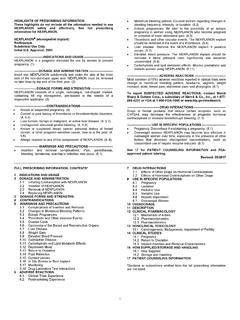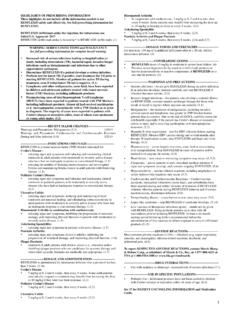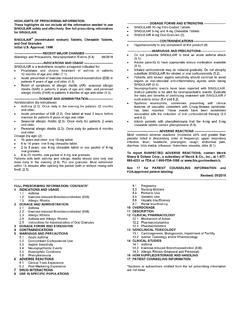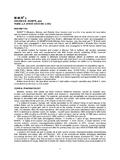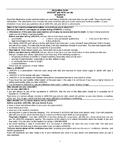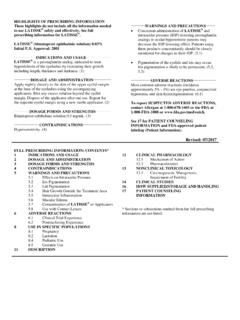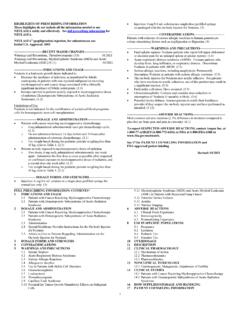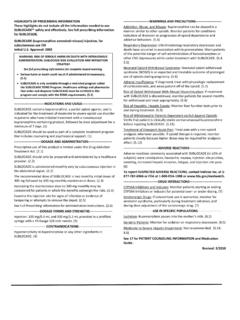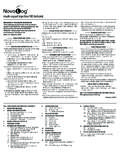Transcription of HIGHLIGHTS OF PRESCRIBING INFORMATION …
1 HIGHLIGHTS OF PRESCRIBING INFORMATION metastatic gastric or gastroesophageal junction adenocarcinoma These HIGHLIGHTS do not include all the INFORMATION needed to use whose tumors express PD-L1 [Combined Positive Score (CPS). KEYTRUDA safely and effectively. See full PRESCRIBING 1] as determined by an FDA-approved test, with disease INFORMATION for KEYTRUDA. progression on or after two or more prior lines of therapy including fluoropyrimidine- and platinum-containing chemotherapy and if KEYTRUDA (pembrolizumab) for injection, for intravenous use appropriate, HER2/neu-targeted ( ). KEYTRUDA (pembrolizumab) injection, for intravenous use Cervical Cancer Initial Approval: 2014 for the treatment of patients with recurrent or metastatic cervical cancer with disease progression on or after chemotherapy whose ---------------------------RECENT MAJOR CHANGES --------------------------- tumors express PD-L1 (CPS 1) as determined by an FDA- Indications and Usage (1) 06/2018 approved ( ).
2 1. Dosage and Administration (2) 06/2018 This indication is approved under accelerated approval based on Warnings and Precautions (5) 06/2018 tumor response rate and progression-free survival. Continued approval for this indication may be contingent upon verification and ----------------------------INDICATIONS AND USAGE ---------------------------- description of clinical benefit in the confirmatory trials. 2. KEYTRUDA is a programmed death receptor-1 (PD-1)-blocking This indication is approved under accelerated approval based on antibody indicated in: tumor response rate and durability of response. Continued approval Melanoma for this indication may be contingent upon verification and for the treatment of patients with unresectable or metastatic description of clinical benefit in the confirmatory trials. melanoma. ( ). Non-Small Cell Lung Cancer (NSCLC) ----------------------- DOSAGE AND ADMINISTRATION ----------------------- as a single agent for the first-line treatment of patients with Melanoma: 200 mg every 3 weeks.
3 ( ). metastatic NSCLC whose tumors have high PD-L1 expression NSCLC: 200 mg every 3 weeks. ( ). [(Tumor Proportion Score (TPS) 50%)] as determined by an HNSCC: 200 mg every 3 weeks. ( ). FDA-approved test, with no EGFR or ALK genomic tumor cHL or PMBCL: 200 mg every 3 weeks for adults; 2 mg/kg (up to aberrations. ( ) 200 mg) every 3 weeks for pediatrics. ( , ). as a single agent for the treatment of patients with metastatic Urothelial Carcinoma: 200 mg every 3 weeks. ( ). NSCLC whose tumors express PD-L1 (TPS 1%) as determined MSI-H Cancer: 200 mg every 3 weeks for adults and 2 mg/kg (up by an FDA-approved test, with disease progression on or after to 200 mg) every 3 weeks for children. ( ). platinum-containing chemotherapy. Patients with EGFR or ALK Gastric Cancer: 200 mg every 3 weeks. ( ). genomic tumor aberrations should have disease progression on Cervical Cancer: 200 mg every 3 weeks.
4 ( ). FDA-approved therapy for these aberrations prior to receiving Administer KEYTRUDA as an intravenous infusion over 30 minutes. KEYTRUDA. ( ). in combination with pemetrexed and carboplatin, as first-line --------------------- DOSAGE FORMS AND STRENGTHS --------------------- treatment of patients with metastatic nonsquamous ( ) For injection: 50 mg lyophilized powder in single-dose vial for Head and Neck Squamous Cell Cancer (HNSCC) reconstitution (3). for the treatment of patients with recurrent or metastatic HNSCC Injection: 100 mg/4 mL (25 mg/mL) solution in a single-dose vial with disease progression on or after platinum-containing (3). ( ) -------------------------------CONTRAIND ICATIONS------------------------------- Classical Hodgkin Lymphoma (cHL) None. (4). for the treatment of adult and pediatric patients with refractory cHL, or who have relapsed after 3 or more prior lines of ----------------------- WARNINGS AND PRECAUTIONS ----------------------- ( ) Immune-mediated pneumonitis: Withhold for moderate, and Primary Mediastinal Large B-Cell Lymphoma (PMBCL) permanently discontinue for severe, life-threatening or recurrent for the treatment of adult and pediatric patients with refractory moderate pneumonitis.
5 ( ). PMBCL, or who have relapsed after 2 or more prior lines of Immune-mediated colitis: Withhold for moderate or severe, and ( ) permanently discontinue for life-threatening colitis. ( ). Limitation of Use: KEYTRUDA is not recommended for treatment Immune-mediated hepatitis: Monitor for changes in hepatic of patients with PMBCL who require urgent cytoreductive therapy. function. Based on severity of liver enzyme elevations, withhold or Urothelial Carcinoma discontinue. ( ). for the treatment of patients with locally advanced or metastatic Immune-mediated endocrinopathies ( ): urothelial carcinoma who are not eligible for cisplatin-containing o Hypophysitis: Withhold for moderate and withhold or chemotherapy and whose tumors express PD-L1 [Combined permanently discontinue for severe or life-threatening Positive Score (CPS) 10], or in patients who are not eligible for hypophysitis.
6 Any platinum-containing chemotherapy regardless of PD-L1 o Thyroid disorders: Monitor for changes in thyroid function. ( ) Withhold or permanently discontinue for severe or life- for the treatment of patients with locally advanced or metastatic threatening hyperthyroidism. urothelial carcinoma who have disease progression during or o Type 1 diabetes mellitus: Monitor for hyperglycemia. following platinum-containing chemotherapy or within 12 months Withhold KEYTRUDA in cases of severe hyperglycemia. of neoadjuvant or adjuvant treatment with platinum-containing Immune-mediated nephritis: Monitor for changes in renal function. chemotherapy. ( ) Withhold for moderate, and permanently discontinue for severe or Microsatellite Instability-High Cancer life-threatening nephritis. ( ). for the treatment of adult and pediatric patients with unresectable Immune-mediated skin adverse reactions including, Stevens- or metastatic, microsatellite instability-high (MSI-H) or mismatch Johnson syndrome (SJS) and toxic epidermal necrolysis (TEN): repair deficient Withhold for severe and permanently discontinue for life- o solid tumors that have progressed following prior treatment threatening skin reactions.
7 ( ). and who have no satisfactory alternative treatment options,2 Other immune-mediated adverse reactions: In organ transplant or recipients, consider the benefit of treatment with KEYTRUDA. o colorectal cancer that has progressed following treatment versus the risk of possible organ rejection. ( ). with a fluoropyrimidine, oxaliplatin, and ( ) Infusion-related reactions: Stop infusion and permanently Limitation of Use: The safety and effectiveness of KEYTRUDA in discontinue KEYTRUDA for severe or life-threatening infusion pediatric patients with MSI-H central nervous system cancers reactions. ( ). have not been established. ( ) Complications of allogeneic HSCT ( ): Gastric Cancer o Allogeneic HSCT after treatment with KEYTRUDA: Monitor for the treatment of patients with recurrent locally advanced or for hepatic veno-occlusive disease, grade 3-4 acute GVHD.
8 Including hyperacute GVHD, steroid-requiring febrile Most common adverse reactions (reported in 20% of patients) were syndrome, and other immune-mediated adverse reactions. fatigue, musculoskeletal pain, decreased appetite, pruritus, diarrhea, Transplant-related mortality has occurred. nausea, rash, pyrexia, cough, dyspnea, constipation, pain, and o Allogeneic HSCT prior to treatment with KEYTRUDA: In abdominal pain. ( ). patients with a history of allogeneic HSCT, consider the benefit of treatment with KEYTRUDA versus the risk of To report SUSPECTED ADVERSE REACTIONS, contact Merck GVHD. Sharp & Dohme Corp., a subsidiary of Merck & Co., Inc., at 1-877- Treatment of patients with multiple myeloma with a PD-1 or PD-L1 888-4231 or FDA at 1-800-FDA-1088 or blocking antibody in combination with a thalidomide analogue plus ----------------------- USE IN SPECIFIC POPULATIONS ----------------------- dexamethasone is not recommended outside of controlled clinical Lactation: Discontinue nursing or discontinue KEYTRUDA.
9 ( ). trials. ( ). Embryofetal toxicity: KEYTRUDA can cause fetal harm. Advise See 17 for PATIENT COUNSELING INFORMATION and Medication females of reproductive potential of the potential risk to a fetus. Guide. ( ). Revised: 06/2018. ------------------------------ ADVERSE REACTIONS ------------------------------ Increased Mortality in Patients with Multiple Myeloma when FULL PRESCRIBING INFORMATION : CONTENTS* KEYTRUDA is Added to a Thalidomide Analogue and 1 INDICATIONS AND USAGE Dexamethasone Melanoma Embryofetal Toxicity Non-Small Cell Lung Cancer 6 ADVERSE REACTIONS. Head and Neck Cancer Clinical Trials Experience Classical Hodgkin Lymphoma Immunogenicity Primary Mediastinal Large B-Cell Lymphoma 8 USE IN SPECIFIC POPULATIONS. Urothelial Carcinoma Pregnancy Microsatellite Instability-High Cancer Lactation Gastric Cancer Females and Males of Reproductive Potential Cervical Cancer Pediatric Use 2 DOSAGE AND ADMINISTRATION Geriatric Use Patient Selection for Treatment of NSCLC, Gastric Cancer, 10 OVERDOSAGE.
10 Or Cervical Cancer 11 DESCRIPTION. Recommended Dosage for Melanoma 12 CLINICAL PHARMACOLOGY. Recommended Dosage for NSCLC Mechanism of Action Recommended Dosage for HNSCC Pharmacodynamics Recommended Dosage for cHL Pharmacokinetics Recommended Dosage for PMBCL 13 NONCLINICAL TOXICOLOGY. Recommended Dosage for Urothelial Carcinoma Carcinogenesis, Mutagenesis, Impairment of Fertility Recommended Dosage for MSI-H Cancer Animal Toxicology and/or Pharmacology Recommended Dosage for Gastric Cancer 14 CLINICAL STUDIES. Recommended Dosage for Cervical Cancer Melanoma Dose Modifications Non-Small Cell Lung Cancer Preparation and Administration Head and Neck Cancer 3 DOSAGE FORMS AND STRENGTHS Classical Hodgkin Lymphoma 4 CONTRAINDICATIONS Primary Mediastinal Large B-Cell Lymphoma 5 WARNINGS AND PRECAUTIONS Urothelial Carcinoma Immune-Mediated Pneumonitis Microsatellite Instability-High Cancer Immune-Mediated Colitis Gastric Cancer Immune-Mediated Hepatitis Cervical Cancer Immune-Mediated Endocrinopathies 16 HOW SUPPLIED/STORAGE AND HANDLING.
